外研版(2019)选择性必修第一册Unit 2 Onwards and upwards Understanding ideas 课件(44张ppt)
文档属性
| 名称 | 外研版(2019)选择性必修第一册Unit 2 Onwards and upwards Understanding ideas 课件(44张ppt) | 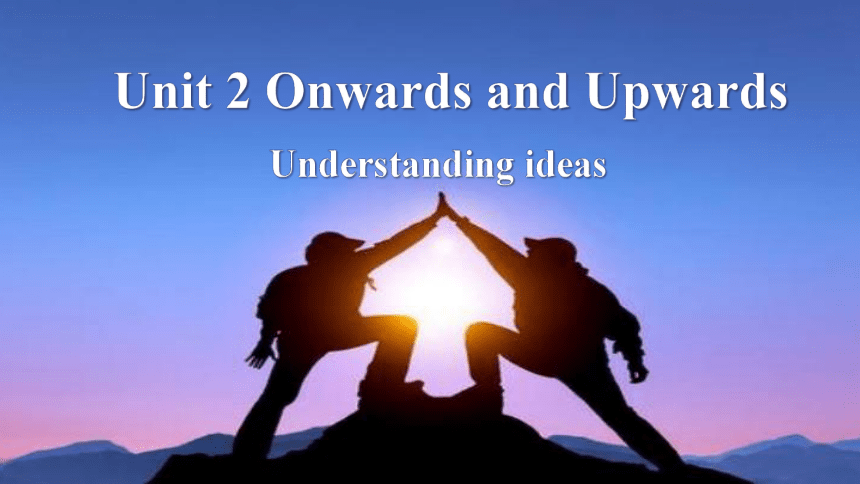 | |
| 格式 | pptx | ||
| 文件大小 | 12.7MB | ||
| 资源类型 | 教案 | ||
| 版本资源 | 外研版(2019) | ||
| 科目 | 英语 | ||
| 更新时间 | 2022-11-18 14:28:08 | ||
图片预览

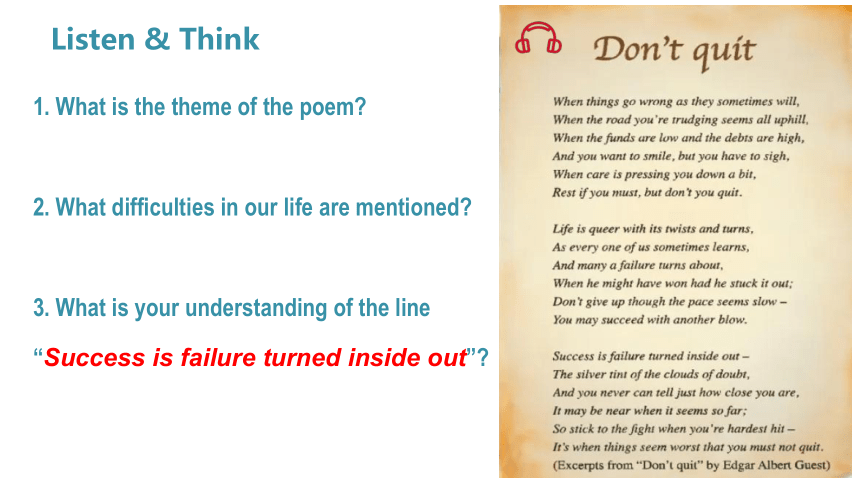
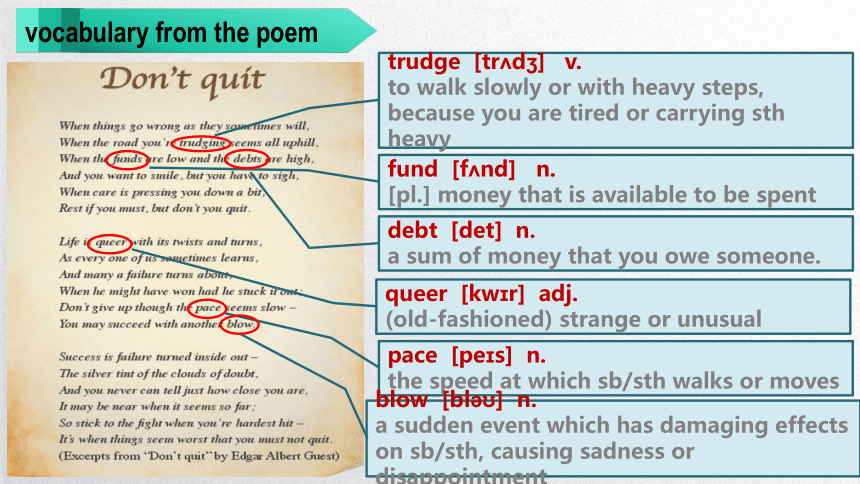

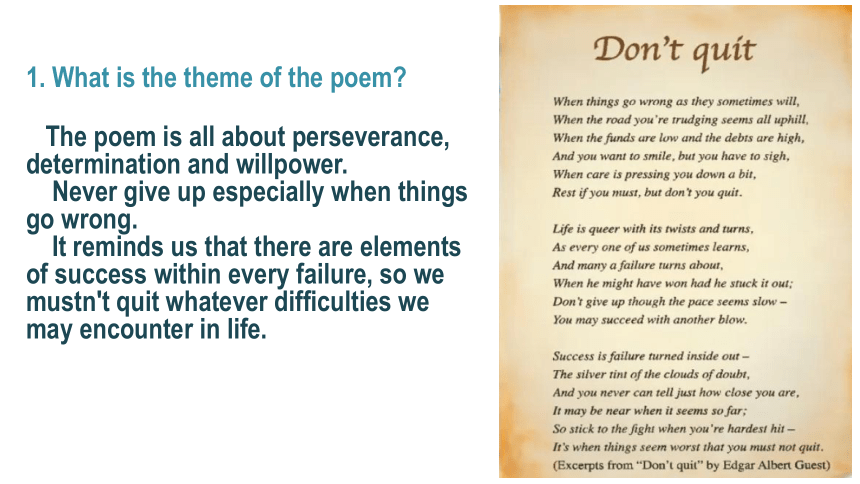
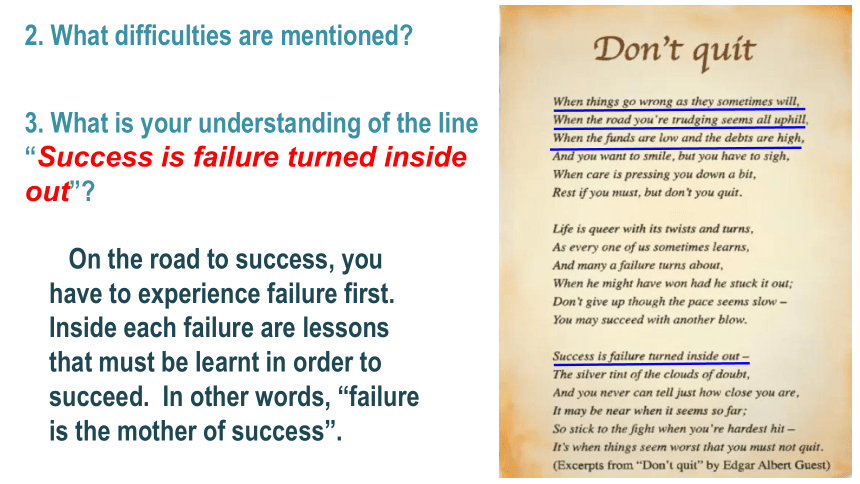
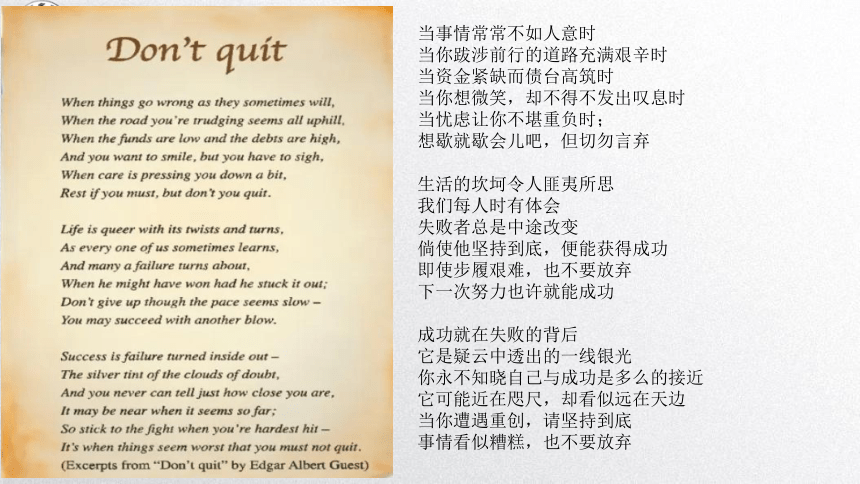
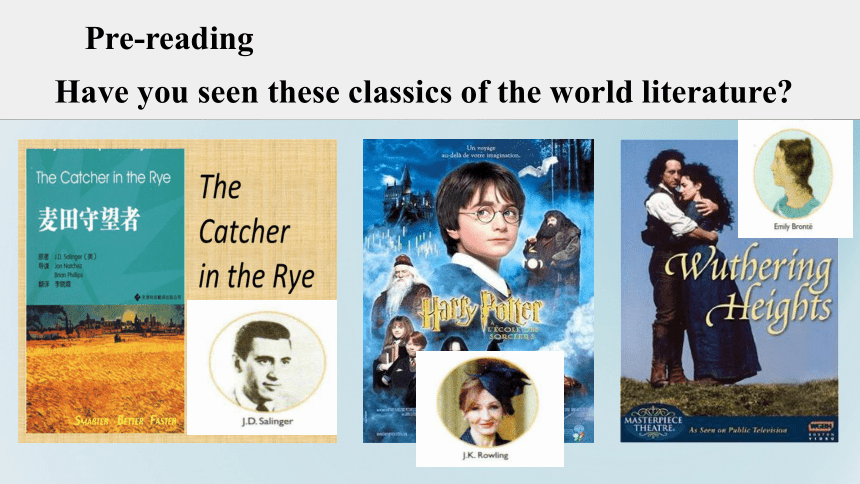
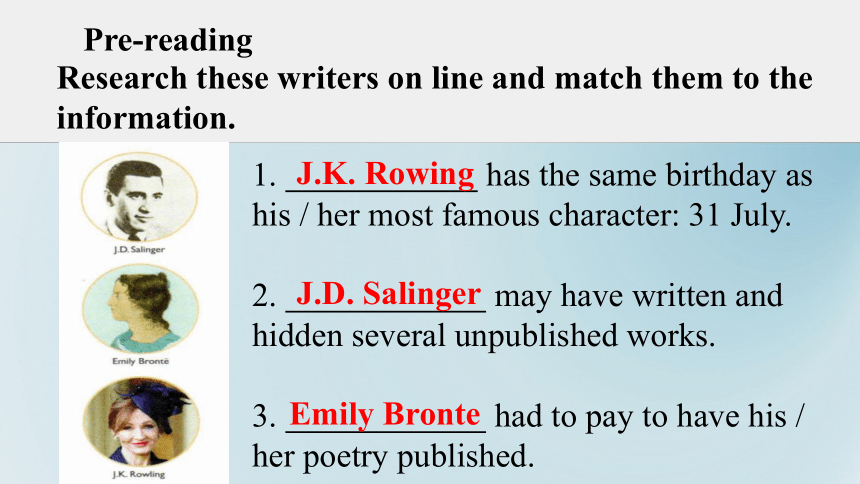
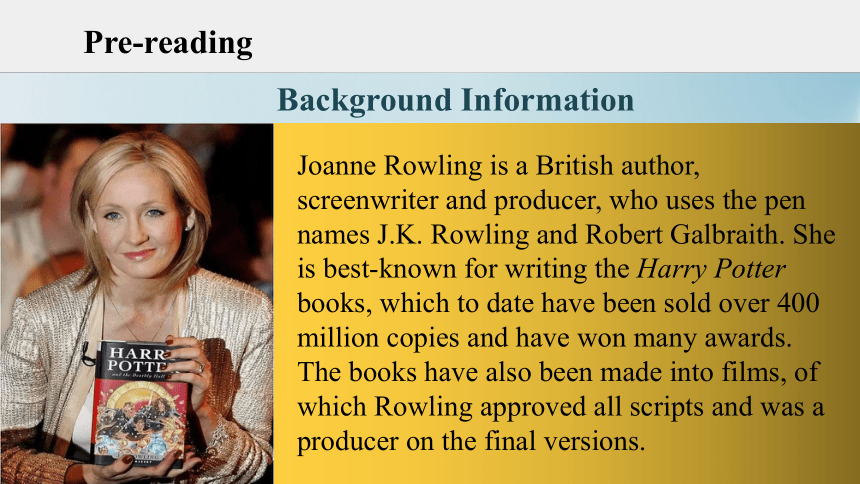
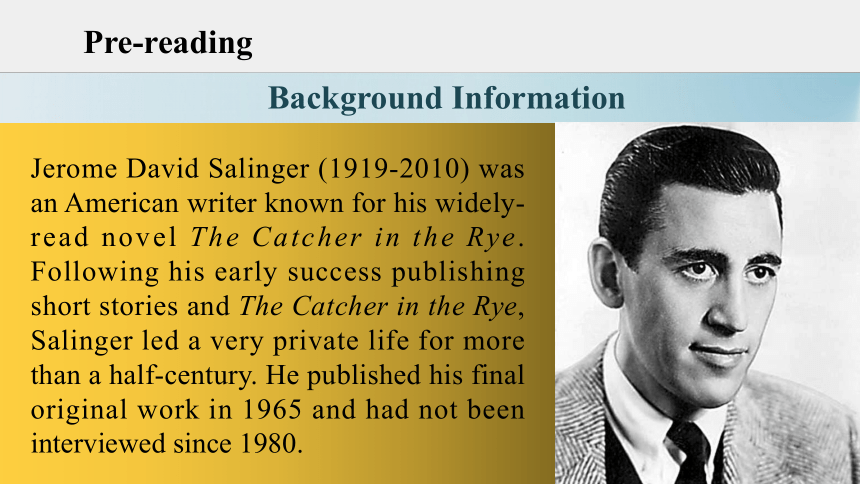
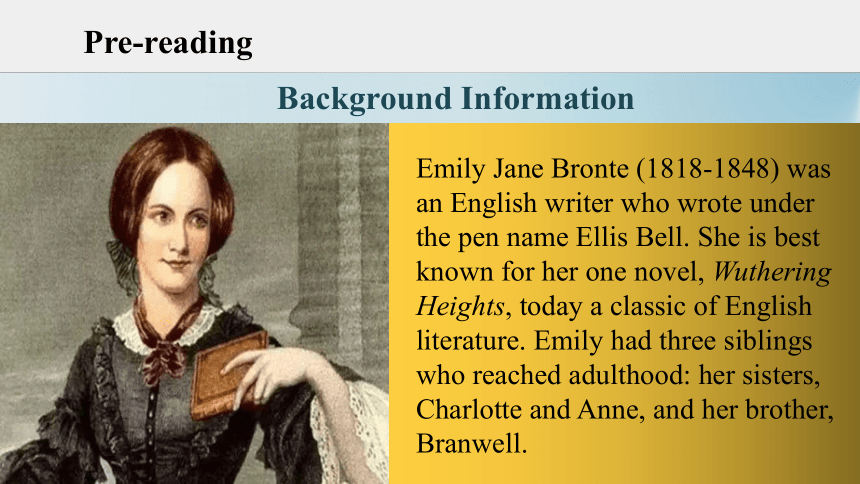
文档简介
(共44张PPT)
Unit 2 Onwards and Upwards
Understanding ideas
Listen & Think
1. What is the theme of the poem
2. What difficulties in our life are mentioned
3. What is your understanding of the line “Success is failure turned inside out”
vocabulary from the poem
trudge [tr d ] v.
to walk slowly or with heavy steps, because you are tired or carrying sth heavy
fund [f nd] n.
[pl.] money that is available to be spent
debt [det] n.
a sum of money that you owe someone.
queer [kw r] adj.
(old-fashioned) strange or unusual
pace [pe s] n.
the speed at which sb/sth walks or moves
blow [bl ] n.
a sudden event which has damaging effects on sb/sth, causing sadness or disappointment
1. What is the theme of the poem
The poem is all about perseverance, determination and willpower.
Never give up especially when things go wrong.
It reminds us that there are elements of success within every failure, so we mustn't quit whatever difficulties we may encounter in life.
2. What difficulties are mentioned
3. What is your understanding of the line “Success is failure turned inside out”
On the road to success, you have to experience failure first. Inside each failure are lessons that must be learnt in order to succeed. In other words, “failure is the mother of success”.
当事情常常不如人意时
当你跋涉前行的道路充满艰辛时
当资金紧缺而债台高筑时
当你想微笑,却不得不发出叹息时
当忧虑让你不堪重负时;
想歇就歇会儿吧,但切勿言弃
生活的坎坷令人匪夷所思
我们每人时有体会
失败者总是中途改变
倘使他坚持到底,便能获得成功
即使步履艰难,也不要放弃
下一次努力也许就能成功
成功就在失败的背后
它是疑云中透出的一线银光
你永不知晓自己与成功是多么的接近
它可能近在咫尺,却看似远在天边
当你遭遇重创,请坚持到底
事情看似糟糕,也不要放弃
Have you seen these classics of the world literature
Pre-reading
Pre-reading
Research these writers on line and match them to the information.
1. has the same birthday as his / her most famous character: 31 July.
2. may have written and hidden several unpublished works.
3. had to pay to have his / her poetry published.
J.K. Rowing
J.D. Salinger
Emily Bronte
Background Information
Pre-reading
Joanne Rowling is a British author, screenwriter and producer, who uses the pen names J.K. Rowling and Robert Galbraith. She is best-known for writing the Harry Potter books, which to date have been sold over 400 million copies and have won many awards. The books have also been made into films, of which Rowling approved all scripts and was a producer on the final versions.
Background Information
Pre-reading
Jerome David Salinger (1919-2010) was an American writer known for his widely-read novel The Catcher in the Rye. Following his early success publishing short stories and The Catcher in the Rye, Salinger led a very private life for more than a half-century. He published his final original work in 1965 and had not been interviewed since 1980.
Background Information
Pre-reading
Emily Jane Bronte (1818-1848) was an English writer who wrote under the pen name Ellis Bell. She is best known for her one novel, Wuthering Heights, today a classic of English literature. Emily had three siblings who reached adulthood: her sisters, Charlotte and Anne, and her brother, Branwell.
II
Fast reading
Fast reading
1. Read the text quickly and choose another suitable title for the passage.
A. Life is Hard for Female Writers
B. Good Things Come to Those Who Wait
C. Never Give Up on Your Dreams
D. Successful Writers
Intensive reading: Find some detailed information.
Read the text carefully. Organise information from the passage and complete the diagram.
Example 1
Writer: ____________
Best Known for: ____________
Experience of rejection:
______________________________________________________________________________________________________
Eventual outcome: _________________________________
J.K. Rowling
Intensive reading: Find some detailed information.
Harry Potter
She was told that his book was too difficult and too long for children and it was rejected twelve times by publishers.
Harry Potter became a global success.
Introduction
A lot of successful writers have previously faced rejection.
Example 2
Writer: ____________
Best Known for: ____________________
Experience of rejection:
____________________________________________________
Eventual outcome: ______________________________________________________________________________________________________________
J.D. Salinger
Intensive reading: Find some detailed information.
The Catcher in the Rye
He received criticism and rejections from several publishers
The Catcher in the Rye became an immediate best-seller after it was published.
Example 3
Writer: _____________
Best Known for: _________________________________________
Experience of rejection:
_______________________________________________________________________________________________________________________________
Eventual outcome: ________________________________________________________
Bronte sisters
Intensive reading: Find some detailed information.
Jane Eyre, Wuthering Heights and Agnes Grey
Women were not encouraged to become writers at that time
Their book of poems which they wrote under male names sold
only two copies.
Their novels are regarded as classics of world literature.
Intensive reading: Find some detailed information.
Conclusion
Perseverance is the key to success.
IV
Post reading
Post reading
“We regret to inform you ... ”
“We are delighted to inform you ... ”
1. What might come next in each sentence
We regret to inform you that your book is rejected / turned down / refused ...
We are delighted to inform you that your book is accepted / well-received ...
Read the sentences from the passage and answer the questions.
Post reading
2. Which paragraph does each of the sentences come from
“We regret to inform you ...” comes from the first paragraph.
“We are delighted to inform you ... ” comes from the last paragraph.
Read the sentences from the passage and answer the questions.
“We regret to inform you ... ”
“We are delighted to inform you ... ”
Post reading
3. Why does the author use them like this within the passage
The author intends to begin with the negative theme of rejection, but then reveal that perseverance can turn a bad beginning into a good ending. Or rather, success comes to those who don’t give up. In addition, the passage is made complete by the way in which the first sentence is mirrored by the last sentence.
Read the sentences from the passage and answer the questions.
“We regret to inform you ... ”
“We are delighted to inform you ... ”
1.What can you learn from these writers
2. Have you read any books by these writers
Recommend one to your classmates.
3. Do you know of any other writer who had similar experiences Share their stories with the class.
think
&
Post reading: Discussion and share.
V
Language points
Language points: Important words
1. regret v (regretted, regretted)
1 ) 后悔;懊悔
regret doing sth 后悔做某事
e.g. 他并不后悔说出自己做了什么,而是觉得他本来可以换一种表达方式。
He did not regret saying what he said but felt that he could have expressed it differently.
Language points: Important words
2 ) [正式用语] 抱歉;遗憾
regret to say / tell / inform ...
e.g. 我很遗憾地通知你,你没有通过考试。
I regret to tell you that you didn’t pass the examination.
Language points: Important words
2. criticism (criticise, critical)
1 ) n 批判主义
2 ) v criticise 批评、批判
criticise sb for 因……批评某人
e.g. 她总是批评她的朋友自私。
She is always criticising her friends for being selfish.
Language points: Important words
3 ) adj critical 批评的、批判性的
critical thinking 批判性思维
e.g. 鼓励学生们培养批判性思维。
Students are encouraged to develop critical thinking.
1. regret to tell you __________________
2. take ... for example __________________
3. have ... in common with __________________
4. turn sb down __________________
5. translate ... into __________________
6. all too often __________________
7. struggle to do sth __________________
8. play a part __________________
遗憾地告诉你
以……举例
和……有共同之处
拒绝某人
把……翻译成……
经常地;频繁地
努力/挣扎着做某事
起作用;扮演角色
Language points: Important phrases
9. stick ... on _________________________
10. survive on _________________________
11. along the … lines _________________________
12. a total of _________________________
13. along with _________________________
14. regard ... as _________________________
15. under ... names _________________________
粘上
靠……生存
类似于(提及的方式或东西)
总共,总计
与……一起,沿(顺)着
认为……是
用……名字
Language points: Important phrases
We regret to inform you ... 该句是拒稿的委婉表达。
也可以表达为:
该句补充完整为:
1. “We regret to inform you ... ” These are the words that every writer dreads receiving, but words every writer knows well.
Language points: Important sentences
We are sorry to tell you ...
We regret to inform you that it is not possible for us to accept your book.
rarely 是表示否定意义的副词。类似的副词还有little, seldom, never, nor, scarcely等。注意:这类副词置于句首时,整个句子要倒装。
e.g. 1. 以前我从未看过如此感人的电影。
2. 她对规则知之甚少。
2. Everyone knows that success rarely happens overnight, but perhaps not many know that a lot of highly sucessful writers have previously faced rejection.
Language points: Important sentences
Never before have I seen such a moving film.
Little does she know about the rules.
1) have ... in common with 和……有共同之处
2) have nothing in common with 和……无共同之处
3. When she received her first rejection letter, she decided that it meant she now had something in common with her favourite writers, and stuck it on her kitchen wall.
Language points: Important sentences
1) have ... in common with 和……有共同之处
e.g. 我们之间有一个共同点,那就是热爱和平。
2) have nothing in common with 和……无共同之处
e.g. 尽管她们是姐妹,但她们一点儿也不像。
Language points: Important sentences
We have something in common with each other — that is the love of peace.
Although they are sisters, they have nothing in common with each other.
4. All too often writers of great works have had to face criticism along with rejection.
Language points: Important sentences
Paraphrase: In addition to rejection, many outstanding writers have frequently experienced their works being criticised.
all too often 又作 only too often,意为frequently。
e.g. 医生常常忙得没有时间跟病人解释治疗方案。
All too often doctors are too busy to explain the treatment to their patients.
5. “I honour endurance, perseverance, industry, talent; because these are the means by which men achieve great ends ...”
Language points: Important sentences
Paraphrase:
I admire endurance, perseverance, industry and talent, because these help people achieve great success.
Language points: Important sentences
endurance: the ability to continue doing something difficult or painful over a long period of time
industry: working very hard
e.g. 没有人怀疑他的忍耐力、勤奋和正直。
No one doubts his endurance, industry and integrity.
Language points: Important sentences
... these are the means by which men achieve great ends ... 为“介词 + 关系代词”引导的定语从句。
“介词 + 关系代词” 引导定语从句时,关系代词常用which(指物)与 whom (指人),即介词 + which / whom。
e.g.
1) In the dark street, there wasn’t a single person _________ she could turn.
2) Here are the questions, some _________ I think are difficult for you.
to whom
of which
Language points: Important sentences
“介词+关系代词”的常见结构:
介词 + which / whom
e.g. 这就是那位我们经常谈论的著名歌唱家。
名词 + of + which / whom
e.g. 请把那本蓝色封面的书递给我。
This is the famous singer about whom we have often talked.
Please pass me the book the cover of which is blue.
Language points: Important sentences
“介词+关系代词”的常见结构:
数词 + of + which / whom
e.g. 我校大约有200位教师,其中百分之三十是女教师。
代词 + of + which / whom
e.g. 我发现篮子里有好些苹果,有些已经坏了。
In our school there are about 200 teachers, thirty percent of whom are women.
In the basket I find many apples, some of which (= of which some) have gone bad.
1)Humor was a means _________ the American writer would win popular acceptance.
2)He caught sight of a small house of a single story, the window was lit up.
3)She has three story books, two are in English.
4)There are fifty students in our class, are from big cities.
by which
of which
of which
most of whom
Language points: Exercise
VI
Homework
Homework
Recommend another book from these writers to your classmates within 80-100 words in English.
Unit 2 Onwards and Upwards
Understanding ideas
Listen & Think
1. What is the theme of the poem
2. What difficulties in our life are mentioned
3. What is your understanding of the line “Success is failure turned inside out”
vocabulary from the poem
trudge [tr d ] v.
to walk slowly or with heavy steps, because you are tired or carrying sth heavy
fund [f nd] n.
[pl.] money that is available to be spent
debt [det] n.
a sum of money that you owe someone.
queer [kw r] adj.
(old-fashioned) strange or unusual
pace [pe s] n.
the speed at which sb/sth walks or moves
blow [bl ] n.
a sudden event which has damaging effects on sb/sth, causing sadness or disappointment
1. What is the theme of the poem
The poem is all about perseverance, determination and willpower.
Never give up especially when things go wrong.
It reminds us that there are elements of success within every failure, so we mustn't quit whatever difficulties we may encounter in life.
2. What difficulties are mentioned
3. What is your understanding of the line “Success is failure turned inside out”
On the road to success, you have to experience failure first. Inside each failure are lessons that must be learnt in order to succeed. In other words, “failure is the mother of success”.
当事情常常不如人意时
当你跋涉前行的道路充满艰辛时
当资金紧缺而债台高筑时
当你想微笑,却不得不发出叹息时
当忧虑让你不堪重负时;
想歇就歇会儿吧,但切勿言弃
生活的坎坷令人匪夷所思
我们每人时有体会
失败者总是中途改变
倘使他坚持到底,便能获得成功
即使步履艰难,也不要放弃
下一次努力也许就能成功
成功就在失败的背后
它是疑云中透出的一线银光
你永不知晓自己与成功是多么的接近
它可能近在咫尺,却看似远在天边
当你遭遇重创,请坚持到底
事情看似糟糕,也不要放弃
Have you seen these classics of the world literature
Pre-reading
Pre-reading
Research these writers on line and match them to the information.
1. has the same birthday as his / her most famous character: 31 July.
2. may have written and hidden several unpublished works.
3. had to pay to have his / her poetry published.
J.K. Rowing
J.D. Salinger
Emily Bronte
Background Information
Pre-reading
Joanne Rowling is a British author, screenwriter and producer, who uses the pen names J.K. Rowling and Robert Galbraith. She is best-known for writing the Harry Potter books, which to date have been sold over 400 million copies and have won many awards. The books have also been made into films, of which Rowling approved all scripts and was a producer on the final versions.
Background Information
Pre-reading
Jerome David Salinger (1919-2010) was an American writer known for his widely-read novel The Catcher in the Rye. Following his early success publishing short stories and The Catcher in the Rye, Salinger led a very private life for more than a half-century. He published his final original work in 1965 and had not been interviewed since 1980.
Background Information
Pre-reading
Emily Jane Bronte (1818-1848) was an English writer who wrote under the pen name Ellis Bell. She is best known for her one novel, Wuthering Heights, today a classic of English literature. Emily had three siblings who reached adulthood: her sisters, Charlotte and Anne, and her brother, Branwell.
II
Fast reading
Fast reading
1. Read the text quickly and choose another suitable title for the passage.
A. Life is Hard for Female Writers
B. Good Things Come to Those Who Wait
C. Never Give Up on Your Dreams
D. Successful Writers
Intensive reading: Find some detailed information.
Read the text carefully. Organise information from the passage and complete the diagram.
Example 1
Writer: ____________
Best Known for: ____________
Experience of rejection:
______________________________________________________________________________________________________
Eventual outcome: _________________________________
J.K. Rowling
Intensive reading: Find some detailed information.
Harry Potter
She was told that his book was too difficult and too long for children and it was rejected twelve times by publishers.
Harry Potter became a global success.
Introduction
A lot of successful writers have previously faced rejection.
Example 2
Writer: ____________
Best Known for: ____________________
Experience of rejection:
____________________________________________________
Eventual outcome: ______________________________________________________________________________________________________________
J.D. Salinger
Intensive reading: Find some detailed information.
The Catcher in the Rye
He received criticism and rejections from several publishers
The Catcher in the Rye became an immediate best-seller after it was published.
Example 3
Writer: _____________
Best Known for: _________________________________________
Experience of rejection:
_______________________________________________________________________________________________________________________________
Eventual outcome: ________________________________________________________
Bronte sisters
Intensive reading: Find some detailed information.
Jane Eyre, Wuthering Heights and Agnes Grey
Women were not encouraged to become writers at that time
Their book of poems which they wrote under male names sold
only two copies.
Their novels are regarded as classics of world literature.
Intensive reading: Find some detailed information.
Conclusion
Perseverance is the key to success.
IV
Post reading
Post reading
“We regret to inform you ... ”
“We are delighted to inform you ... ”
1. What might come next in each sentence
We regret to inform you that your book is rejected / turned down / refused ...
We are delighted to inform you that your book is accepted / well-received ...
Read the sentences from the passage and answer the questions.
Post reading
2. Which paragraph does each of the sentences come from
“We regret to inform you ...” comes from the first paragraph.
“We are delighted to inform you ... ” comes from the last paragraph.
Read the sentences from the passage and answer the questions.
“We regret to inform you ... ”
“We are delighted to inform you ... ”
Post reading
3. Why does the author use them like this within the passage
The author intends to begin with the negative theme of rejection, but then reveal that perseverance can turn a bad beginning into a good ending. Or rather, success comes to those who don’t give up. In addition, the passage is made complete by the way in which the first sentence is mirrored by the last sentence.
Read the sentences from the passage and answer the questions.
“We regret to inform you ... ”
“We are delighted to inform you ... ”
1.What can you learn from these writers
2. Have you read any books by these writers
Recommend one to your classmates.
3. Do you know of any other writer who had similar experiences Share their stories with the class.
think
&
Post reading: Discussion and share.
V
Language points
Language points: Important words
1. regret v (regretted, regretted)
1 ) 后悔;懊悔
regret doing sth 后悔做某事
e.g. 他并不后悔说出自己做了什么,而是觉得他本来可以换一种表达方式。
He did not regret saying what he said but felt that he could have expressed it differently.
Language points: Important words
2 ) [正式用语] 抱歉;遗憾
regret to say / tell / inform ...
e.g. 我很遗憾地通知你,你没有通过考试。
I regret to tell you that you didn’t pass the examination.
Language points: Important words
2. criticism (criticise, critical)
1 ) n 批判主义
2 ) v criticise 批评、批判
criticise sb for 因……批评某人
e.g. 她总是批评她的朋友自私。
She is always criticising her friends for being selfish.
Language points: Important words
3 ) adj critical 批评的、批判性的
critical thinking 批判性思维
e.g. 鼓励学生们培养批判性思维。
Students are encouraged to develop critical thinking.
1. regret to tell you __________________
2. take ... for example __________________
3. have ... in common with __________________
4. turn sb down __________________
5. translate ... into __________________
6. all too often __________________
7. struggle to do sth __________________
8. play a part __________________
遗憾地告诉你
以……举例
和……有共同之处
拒绝某人
把……翻译成……
经常地;频繁地
努力/挣扎着做某事
起作用;扮演角色
Language points: Important phrases
9. stick ... on _________________________
10. survive on _________________________
11. along the … lines _________________________
12. a total of _________________________
13. along with _________________________
14. regard ... as _________________________
15. under ... names _________________________
粘上
靠……生存
类似于(提及的方式或东西)
总共,总计
与……一起,沿(顺)着
认为……是
用……名字
Language points: Important phrases
We regret to inform you ... 该句是拒稿的委婉表达。
也可以表达为:
该句补充完整为:
1. “We regret to inform you ... ” These are the words that every writer dreads receiving, but words every writer knows well.
Language points: Important sentences
We are sorry to tell you ...
We regret to inform you that it is not possible for us to accept your book.
rarely 是表示否定意义的副词。类似的副词还有little, seldom, never, nor, scarcely等。注意:这类副词置于句首时,整个句子要倒装。
e.g. 1. 以前我从未看过如此感人的电影。
2. 她对规则知之甚少。
2. Everyone knows that success rarely happens overnight, but perhaps not many know that a lot of highly sucessful writers have previously faced rejection.
Language points: Important sentences
Never before have I seen such a moving film.
Little does she know about the rules.
1) have ... in common with 和……有共同之处
2) have nothing in common with 和……无共同之处
3. When she received her first rejection letter, she decided that it meant she now had something in common with her favourite writers, and stuck it on her kitchen wall.
Language points: Important sentences
1) have ... in common with 和……有共同之处
e.g. 我们之间有一个共同点,那就是热爱和平。
2) have nothing in common with 和……无共同之处
e.g. 尽管她们是姐妹,但她们一点儿也不像。
Language points: Important sentences
We have something in common with each other — that is the love of peace.
Although they are sisters, they have nothing in common with each other.
4. All too often writers of great works have had to face criticism along with rejection.
Language points: Important sentences
Paraphrase: In addition to rejection, many outstanding writers have frequently experienced their works being criticised.
all too often 又作 only too often,意为frequently。
e.g. 医生常常忙得没有时间跟病人解释治疗方案。
All too often doctors are too busy to explain the treatment to their patients.
5. “I honour endurance, perseverance, industry, talent; because these are the means by which men achieve great ends ...”
Language points: Important sentences
Paraphrase:
I admire endurance, perseverance, industry and talent, because these help people achieve great success.
Language points: Important sentences
endurance: the ability to continue doing something difficult or painful over a long period of time
industry: working very hard
e.g. 没有人怀疑他的忍耐力、勤奋和正直。
No one doubts his endurance, industry and integrity.
Language points: Important sentences
... these are the means by which men achieve great ends ... 为“介词 + 关系代词”引导的定语从句。
“介词 + 关系代词” 引导定语从句时,关系代词常用which(指物)与 whom (指人),即介词 + which / whom。
e.g.
1) In the dark street, there wasn’t a single person _________ she could turn.
2) Here are the questions, some _________ I think are difficult for you.
to whom
of which
Language points: Important sentences
“介词+关系代词”的常见结构:
介词 + which / whom
e.g. 这就是那位我们经常谈论的著名歌唱家。
名词 + of + which / whom
e.g. 请把那本蓝色封面的书递给我。
This is the famous singer about whom we have often talked.
Please pass me the book the cover of which is blue.
Language points: Important sentences
“介词+关系代词”的常见结构:
数词 + of + which / whom
e.g. 我校大约有200位教师,其中百分之三十是女教师。
代词 + of + which / whom
e.g. 我发现篮子里有好些苹果,有些已经坏了。
In our school there are about 200 teachers, thirty percent of whom are women.
In the basket I find many apples, some of which (= of which some) have gone bad.
1)Humor was a means _________ the American writer would win popular acceptance.
2)He caught sight of a small house of a single story, the window was lit up.
3)She has three story books, two are in English.
4)There are fifty students in our class, are from big cities.
by which
of which
of which
most of whom
Language points: Exercise
VI
Homework
Homework
Recommend another book from these writers to your classmates within 80-100 words in English.
